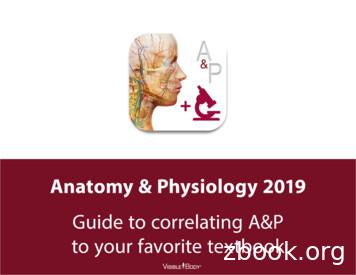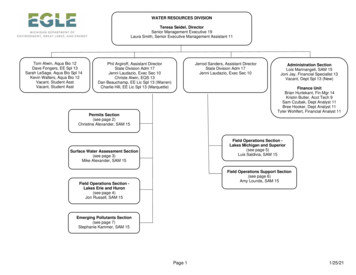Bio 105: Anatomy And Physiology I Syllabus Lecture/Lab Hours . - Rcsj
BIO 105: ANATOMY AND PHYSIOLOGY ISYLLABUSLECTURE/LAB HOURS/CREDITS: 3/3/4CATALOG DESCRIPTIONPrerequisite: High school chemistry or CHM 107 – Introductory Chemistry orCHM 111 – General Chemistry IHigh school biology or BIO 101 – General Biology I, BIO 107 – Human Biology orBIO 111 – Contemporary Concepts in BiologyRDG 099 – Introduction to College Reading IIIThis course presents a comprehensive study of the structure and function of the gross andmicroscopic organization of the human body. Emphasis is placed on the integumentary,skeletal, muscular and nervous systems. Laboratory experiences include computer-assistedinstruction and experimental labs which reinforce contemporary scientific concepts.TEXTBOOK AND COURSE MATERIALSIt is the responsibility of the student to confirm with the bookstore and/or their instructor thetextbook, handbook and other materials required for their specific course and section.Please see current textbook prices at rcgc.bncollege.comEVALUATION AND ASSESSMENTGrading DistributionIndividual instructors may include thefollowing assessment(s): Exams Quizzes Class Discussions Written Assignments Attendance and ParticipationGrading to be determined by individual instructorsGrading Scale ExampleThe grading scale for each course and section will be determined by the instructor and distributedthe first day of class.Fall 2017
2ROWAN COLLEGE AT GLOUCESTER COUNTY CORE COMPETENCIES(Based on the NJCC General Education Foundation - August 15, 2007; Revised 2011)This comprehensive list reflects the core competencies that are essential for all RCGC graduates;however, each program varies regarding competencies required for a specific degree. Criticalthinking is embedded in all courses, while teamwork and personal skills are embedded in manycourses.RCGC Core Competencies1Written and Oral CommunicationStudents will communicate effectively in both speech and writing.2Quantitative Knowledge and SkillsStudents will use appropriate mathematical and statistical concepts and operations tointerpret data and to solve problems.3Scientific Knowledge and ReasoningStudents will use the scientific method of inquiry, through the acquisition of scientificknowledge.4Technological CompetencyStudents will use computer systems or other appropriate forms of technology to achieveeducational and personal goals.5Society and Human BehaviorStudents will use social science theories and concepts to analyze human behavior andsocial and political institutions and to act as responsible citizens.6Humanistic PerspectiveStudents will analyze works in the fields of art, history, music, or theater; literature;philosophy and/or religious studies; and/or will gain competence in the use of a foreignlanguage7Historical PerspectiveStudents will understand historical events and movements in World, Western, nonWestern or American societies and assess their subsequent significance.8Global and Cultural AwarenessStudents will understand the importance of a global perspective and culturally diversepeoples.9Ethical Reasoning and ActionStudents will understand ethical issues and situations.Information Literacy10 Students will address an information need by locating, evaluating, and effectively usinginformationBIO 105 CORE COMPETENCIESThis course focuses on one of RCGC’s Core Competencies: Scientific Knowledge and ReasoningFall 2017
3STUDENT LEARNING OUTCOMES: BIO 105 – ANATOMY AND PHYSIOLOGY ISuccessful completion of BIO 105 willhelp students:RCGC CoreCompetenciesEvaluation / Assessment(Additional means of evaluationmay be included by individualinstructors)1. Describe, paraphrase, and summarizecollege-level material accurately.- Scientific Knowledgeand Reasoning- Exams- Laboratory exercises2. Illustrate knowledge of laboratoryequipment and competence in its use.- Scientific Knowledgeand Reasoning- Exams- Laboratory exercises3. Apply knowledge to solve newproblems.- Scientific Knowledgeand Reasoning- Exams- Laboratory exercises4. Work collaboratively with others.- Scientific Knowledgeand Reasoning- Laboratory exercises5. Communicate using scientificterminology correctly.- Scientific Knowledgeand Reasoning- Presentation rubricFall 2017
4BIO 105 TOPICAL OUTLINELectureLabIntroduction to the Human BodyIntroduction to Anatomy and PhysiologyThe CellIntroduction to the Microscope and CellStructuresCell TransportTissueHistologyIntegumentary SystemIntegumentary System LabBone TissueThe SkeletonJointsAxial and Appendicular Skeletal AnatomyLabBone Tissue, Muscle Tissue and Joints LabMuscles and Muscle TissueSkeletal Muscle Physiology LabThe Muscular SystemMuscle Anatomy LabFundamentals of the Nervous System andNervous TissueNervous Physiology LabThe Central Nervous SystemBrain and Spinal Cord LabThe Peripheral Nervous SystemPeripheral Nervous System LabAffirmative Action StatementThe Board of Trustees is committed to providing an educational and workplace environment free fromunlawful harassment and discrimination. All forms of employment and educational discrimination andharassment based upon race, creed, color, national origin, age, ancestry, nationality, marital or domesticpartner or civil union status, sex, pregnancy, gender identity or expression, disability, liability for militaryservice, affectional, or sexual orientation, atypical cellular or blood trait, genetic information (includingrefusal to submit to genetic testing) are prohibited and will not be tolerated.For questions concerning discrimination contact Almarie J. Jones, Executive Director, Diversity andEquity, Affirmative Action/Title IX Officer at 856-415-2154 or ajones@rcgc.edu.For disability issues, contact Dennis M. Cook, Director, Department of Special Services, ADAAA/504Officer at 856-415-2265 or dcook@rcgc.edu.Department of Special ServicesThe Department of Special Services, located in the Instructional Center, room 425A, welcomes studentsof all abilities. The staff members in Special Services are committed to providing support services andensuring equal access to eligible students with documented disabilities as outlined by the Americans withDisabilities Act (ADA) and the Americans with Disabilities Act with Amendments Act (ADAAA).Fall 2017
5To maximize the potential of eligible students who self-identify, the Special Services staff provides anarray of support services which may include extra time for tests and quizzes, testing in a separate location,advisement, interpreters, scribes, tutors, assistive technology (such as magnification devices and audioamplification), touch screen computers, audio books and note-taking assistance.As students embark on their academic journey, they are encouraged to meet with staff members toidentify, develop and implement support services that are in accord with their individual academic needs.Students are also encouraged to make use of other college support services that are available to all RCGCstudents currently enrolled in credited academic courses, such as tutoring services and the college library,which offer online information research and other materials needed to complement their studies.Students registered with the Department of Special Services and who plan to earn an associate degree,further their education and transfer to a four-year institution, or enter the workforce, are encouraged tochoose a corresponding program of study (college major) as soon as possible. The Special Services staffassists enrolled students with additional support that focuses on advancing students through their selectedprograms of study towards a goal of graduating.Students who request academic support from the Department of Special Services can be assured thatconfidentiality will always be maintained. Accommodations are provided to address the special needs ofindividuals with disabilities under Section 504 of the 1973 Rehabilitation Act and the Americans withDisabilities Act (ADA) of 1990 together with the ADA Amendments Act of 2008 (ADAAA). Underthese acts, the office advocates a user-friendly campus for accessibility and a learning-friendly campus foracademic success.For more information or to schedule an appointment to meet Special Services staff, please call 856-4152265 or visit RCGC.edu/SpecialServices.To Register with Special ServicesStudents must follow these steps: Complete and submit the Student Profile form. Access the Student Profile Form.Submit documentation detailing the student’s disability. Support services will not be grantedwithout documentation specifying the student’s disability. Documentation should include thefollowing information:a.b.c.d.e. Diagnosis with written evaluation of current disability;Date the student was diagnosed;Tests used to reach diagnosis;Credentials of the medical professional conducting evaluation; andHow the disability affects daily activities and/or academic performance.By clicking on the following links, students can download the Special Education Records ReleaseForm and/or Medical Release Form to present to their medical care professional.Contact the Special Services office to schedule a meeting with a staff member.1. Students should schedule a meeting after submitting the Student Profile Form, properdocumentation and completing the College’s placement test. (Click on SpecialAccommodations for Placement Testing to determine whether student should arrangehis/her placement test through the Special Services office or the general Testing Center.Fall 2017
62.During the meeting, the student and staff member will discuss his or her disability anddetermine eligible accommodations.AccommodationsStudents who qualify for accommodations are encouraged to register with the Department of SpecialServices at RCGC before they begin their academic career at Rowan College. This allows students to takeadvantage of any special accommodations and auxiliary aids that they might need and be eligible toreceive. Special accommodations include but are not limited to extended time on tests, private test roomsto complete tests with the assistance of a reader or scribe, as well as a distraction-free test room. Auxiliary aids include but are not limited to note takers, tape recorders, large display calculators,interactive calculators, desktop magnifiers, large-screen computer monitors, touch-screen computermonitors, touch-screen laptop computers and JAWS software. More information about adaptivetechnology can be found on the technology link. Students are responsible for identifying whichaccommodations and auxiliary aids they require for academic support.ConfidentialityStudents who register with the Department of Special Services are assured that their information iskept confidential.In addition, the student's transcript will not indicate that the he or she is registered with the Department ofSpecial Services. The student's specific special need is not disclosed to the student's instructors. However,accommodation letters are sent to each of the student’s professors if the student needstesting accommodations or accommodations in the classroom. It is the student's choice whether or not todisclose the specifics of his or her special need.Fall 2017
SYLLABUS LECTURE/LAB HOURS/CREDITS: 3/3/4 . chemistry or CHM 107 - Introductory Chemistry or CHM 111 - General Chemistry I High school biology or BIO 101 - General Biology I, BIO 107 - Human Biology or BIO 111 - Contemporary Concepts in Biology RDG 099 - Introduction to College Reading III This course presents a comprehensive .
Anatomy & Physiology 2019: Correlations 2 Essentials of Human Anatomy, 10th Edition by Elaine N. Marieb Human Anatomy & Physiology, 9th Edition by Elaine N. Marieb and Katja Hoehn Fundamentals of Anatomy and Physiology, 9th Edition by Frederic H. Martini, Judi L. Nath, and Edwin F. Bartholomew Anatomy &
Marieb, Elaine and Mitchell, Susan. Human Anatomy and Physiology Laboratory Manual, Cat Version and Mastering Anatomy & Physiology, Integrated, 12th Edition. Pearson, 2016. ISBN: 978-978-0134156767. Recommended: Rust, Thomas. A Guide to Anatomy and Physiology Lab, 2nd Edition. Southwest Education Enterprises, 1986. ISBN: 0-937-02900-9
HUMAN ANATOMY AND PHYSIOLOGY Anatomy: Anatomy is a branch of science in which deals with the internal organ structure is called Anatomy. The word “Anatomy” comes from the Greek word “ana” meaning “up” and “tome” meaning “a cutting”. Father of Anatomy is referred as “Andreas Vesalius”. Ph
Clinical Anatomy RK Zargar, Sushil Kumar 8. Human Embryology Daksha Dixit 9. Manipal Manual of Anatomy Sampath Madhyastha 10. Exam-Oriented Anatomy Shoukat N Kazi 11. Anatomy and Physiology of Eye AK Khurana, Indu Khurana 12. Surface and Radiological Anatomy A. Halim 13. MCQ in Human Anatomy DK Chopade 14. Exam-Oriented Anatomy for Dental .
159386 BIO BIO 301 Biotechnology and Society 158405 BIO BIO 202 Microbiology and Immunology 158396 BIO BIO 304 Ecology of Place 159428 BIO BIO 300 Population, Resources and Environment 159430 BIO ENS 110 Populations, Resources and Environment 151999 ENG ENG 340 Global British Literature
Dawn Roush, Env Mgr 14 Kevin Goodwin, Aqua Bio Spl 13 Bill Keiper, Aqua Bio Spl 13 Sam Noffke, Aqua Bio 12 Lee Schoen, Aqua Bio 11 Elizabeth Stieber, Aqua Bio 11 Kelly Turek, Aqua Bio 12 Chris Vandenberg, EQA 11 Jeff Varricchione, Aqua Bio 12 Matt Wesener, Aqua Bio 11 Marcy Knoll Wilmes, Aqua Bio Spl 13
8 Respiratory Physiology 9 Respiratory physiology I 10 Renal Physiology 11 Digestive Physiology (spring only) 12 Lab exam 2 ** ** For an accurate display of lab dates and exam dates please consult the Human Anatomy and Physiology II web site. Laboratory assessment will be as follows: Total 1. Introductory exercise 10 2.
Anatomy and physiology for sports massage The aim of this unit is to develop the knowledge and understanding of anatomy and physiology relevant to sports massage. You will explore the anatomy and physiology of each of the body systems and look at the physical, physiological, neurological and psychological effects of sports massage on these systems.























